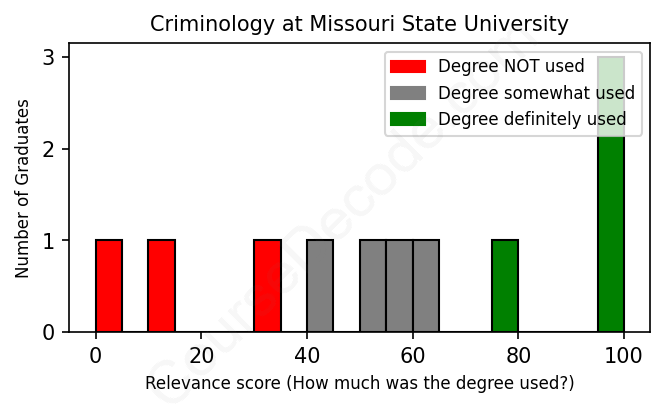
First, some facts. Of the Criminology graduates from Missouri State University we've analyzed , here's how many have used (or NOT used) their degree in their career:

These are estimates based on AI analysis of 11 LinkedIn profiles (see below).
The verdict? Below average. Overall, with an average relevance score of 57%, Criminology graduates from Missouri State University have a lower likelihood (-10%) of finding work in this field compared to the average graduate across all fields:
And for comparison, here's the chart for all profiles we've looked at across all degrees.
Also, after graduating, only 9% of these graduates have pursued further education other than another Bachelor's degree (such as a Masters degree or other), compared to the average across all profiles of 35%. This suggests a Bachelors degree is enough for most Criminology graduates, and it's normal to look for work straight after graduation.
See the details:
|
Relevance score: 100% We think this person has gone into a career highly relevant to their degree. We think this person has gone into a career highly relevant to their degree.
DEGREE INFOGraduated in 2014 from Missouri State University with a Bachelor's degree in Criminology. No other secondary education since. JOB HISTORY SINCE GRADUATIONLead Case Manager Dismas House of St. Louis Jun 2017 - Present ABOUTNo information provided. |
The top 10 most common jobs done by the graduates we've analyzed (ranked most common to least) are:
When looking at the career paths of graduates with a Criminology degree from Missouri State University, it becomes clear that many have pursued jobs closely related to the field. A significant number of individuals have taken up roles such as Criminal Investigators, Probation Parole Officers, and various positions within organizations focused on advocacy and support for victims of crime, like the Metropolitan Organization to Counter Sexual Assault (MOCSA) and Harmony House. These roles definitely utilize the knowledge and skills gained during their studies, applying criminological theories and practices in real-world settings. For instance, positions like the Loss Prevention Officer and Pretrial Services Officer clearly demonstrate how these graduates can leverage their criminology training effectively in monitoring and preventing criminal activities.
However, there's also a notable trend where some graduates have landed in jobs that aren't directly related to criminology. Positions in IT, logistics, or various administrative roles seem to dominate the profiles of several alumni, like those working as IT Technicians or in logistics management. While skills like analytical thinking and problem-solving could find some crossover, many of these jobs don’t make full use of their criminology education. It’s a bit of a mixed bag, really—while many are able to secure roles that are relevant and apply what they've learned, others seem to drift away from the core of what they studied. In short, if you're eyeing a future in criminology, there's a solid chance you'll see its direct relevance in your job. Just be prepared that some graduates might find themselves in roles that are not the typical criminology career path.
Here is a visual representation of the most common words in job titles for Criminology graduates (this is across all Criminology graduates we've analyzed, not just those who went to Missouri State University):

Graduates from Missouri State University with a degree in Criminology seem to have a mixed bag of career trajectories. For many, their first jobs post-graduation are often related to criminal justice, social services, or law enforcement roles. For instance, some graduates have started as Criminal Investigators or Probation Officers, which aligns well with their criminology background. However, others have gone in different directions, such as working in IT or logistics, which indicates that not every graduate is sticking closely to their degree's field. It's not uncommon for newcomers to take jobs that may not seem directly related to criminology, such as administrative roles or customer service positions, at least early on in their careers.
Five or ten years down the line, some alumni have indeed transitioned into solid careers within their field. You can find individuals in positions like Lead Case Manager, Director of Loss Prevention, and various roles in social advocacy, which highlight a commitment to justice and community support. However, it's also clear that several graduates have diversified their career paths significantly, often moving into completely different sectors like IT and logistics. While some have successfully navigated their way into jobs that utilize their criminology education, there are certainly others who find themselves in roles that are only tangentially related to their degree. So, while there's potential for a meaningful career in criminology, the reality is that not all graduates will land in jobs that directly apply their studies. It really depends on individual choices and the job market they encounter after graduation.
Honestly, a Bachelor's degree in Criminology, like the one at Missouri State University, is pretty manageable compared to some other majors. You'll dive into topics like criminal behavior, justice systems, and social issues, which can be engaging and interesting, especially if you’re into that stuff. There can be a fair amount of reading and writing, particularly for research papers, but it’s not like you’re slogging through intense math or science classes. Many students find it a blend of challenge and interest, so if you’re passionate about the subject, you’re likely to find it more enjoyable than tough. Overall, it’s around average in terms of difficulty and definitely doable with some effort and organization!
Most commonly, in the LinkedIn profiles we've looked at, it takes people 5 years to finish a Bachelor degree in Criminology.
Looking at these Criminology grads from Missouri State University, it seems like they're on a mixed financial path. Some, like the Criminal Investigator and Director of Loss Prevention, likely pull in decent salaries, especially considering their positions in state departments and well-known hotels. Others, especially those in advocacy roles or entry-level positions, might not be making a lot yet but could see their earnings grow as they gain experience. The IT grads could also be doing pretty well given the demand for tech jobs. Overall, while not everyone is rolling in cash, several of these roles offer good potential for solid pay over time, especially as they climb the career ladder!
Here is a visual representation of the most common words seen in the "about" section of LinkedIn profiles who have a Bachelor degree in Criminology (this is across all Criminology graduates we've analyzed, not just those who went to Missouri State University). This may or may not be useful:

Here are all colleges offering a Bachelor degree in Criminology (ordered by the average relevance score of their Criminology graduates, best to worst) where we have analyzed at least 10 of their graduates:
| College | Score | Count |
|---|---|---|
 California State University, Fresno California State University, Fresno
|
67 | 20 |
 George Mason University George Mason University
|
63 | 27 |
 Arizona State University Arizona State University
|
58 | 17 |
 Missouri State University Missouri State University
|
57 | 11 |
 The Ohio State University The Ohio State University
|
56 | 16 |
 Penn State University Penn State University
|
55 | 16 |
 Florida State University Florida State University
|
54 | 60 |
 West Virginia University West Virginia University
|
51 | 20 |
 University of Maryland University of Maryland
|
51 | 11 |
 John Jay College (CUNY) John Jay College (CUNY)
|
50 | 21 |
 University of South Florida University of South Florida
|
49 | 47 |
 Central Connecticut State University Central Connecticut State University
|
49 | 13 |
 University of Florida University of Florida
|
48 | 21 |
 The University of Texas at Dallas The University of Texas at Dallas
|
48 | 10 |
 Indiana University of Pennsylvania Indiana University of Pennsylvania
|
48 | 20 |
 Mississippi State University Mississippi State University
|
46 | 10 |